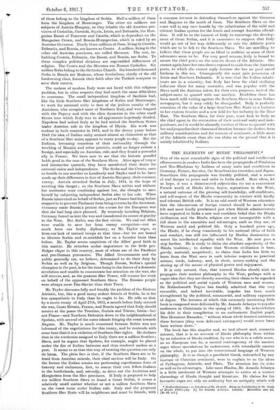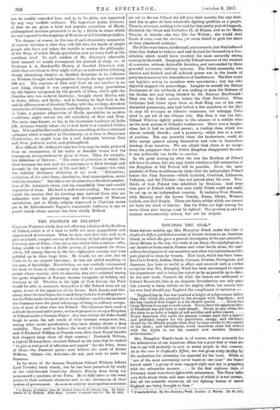THE ELEMENTS OF HINDU PHILOSOPHY..
ONE of the most remarkable signs of the political and intellectual effervescence in modern India has been the propaganda of Hinduism and Men-Hinduism by Indians of many sorts and conditions in Germany, France,Amerie.a, the Scandinavian countries, and Japan. Sometimes this propaganda was frankly political, and a source of real danger to peace and order in India itself. More often, let us hope, it was a disinterested rukariastion (to use a convenient French word) of Hindu ideas, hopes, aspirations in the West, a natural outcome of the growing self-knowledge, self-confidence, and self-respect of the Hindu community in contact with kindly am! tolerant British rule. It is an odd result of Western education that the irksomeness of foreign control should be most keenly felt and most loudly proclaimed just when British administrators have imparted to India a new and confident belief that the Hindu civilization and the Hindu religion are not incompatible with a full glare in the amenities and advantages, such as they are, of Western social and political life. Only a hundred years ago, the Hindu, if Inc clung tenaciously to his national ideas of faith and conduct, was still too influenced by Muslim domination to assert his intellectual equality with the West. He now goes mu step further. He is ready to claim the absolute superiority of Its,, Hindu tradition ; to declare that Western civilization is base, greedy, material, unspiritual ; to claim that India has little to learn from the West stave in such inferior respects as practical science, trade, industry, and, in short, money.making and the storing up of the means of physical power and enjoyment.
It is only natural, then, that learned Hindus elsould with to propagate their ancient philosophy in the West, perhaps with is vague idea that they arc thereby asserting their claim to be regarded as tho political and social equals of Western men and women. Sir Rabindranath Tagore hats frankly admitted that this very excusable, and indeed inevitable, impulse has been muck strengthened by the political, commercial, and military expamtion of Japan. The lectures of which this extremely interesting little book in composed were delivered by Mr. Arland% Acharya to popular audiences in Christiania in the spring of 1915. He acknowledgee his debt in their compilation to an enthusiastic English pupil, Miss Hermione Ramsden, " without whose whole-heartml assistance these lectures [they were delivered extempore] would never have been written down."
The book has this singular and, we had almost said, romantic interest, that it is an account of Hindu philosophy from within by an inheritor of Hindu tradition, by one who is in a subtle sense, as no Europsan can be, a mental contemporary of the ancient sages whose speculations Inc endeavours, with remarkable success on the whole, to put into the conventional language of Western philosophy. It is as though a pantheist Greek, untouched by any tincture of Christian sentiment, were to explain to us the ideas of Pythagoras, Aristotle, and Plato. The situation bas its risks as well as its advantages. Like moat Hindus, Mr. Ananda Aeharya is a little intolerant of Western attempts to arrive at a correct chronology of Hindu thought and literature. He claims for his favourite sages not only an authority but an antiquity which will • Itrahnindareanant ; cr,Intnitton of the Ahtolutr. Being an Introdurtion to the Study of Hindu Philos-14. Ey Sri Anandn Achar3o. London Lama]. nod W. Its. Id. net.j not be readily conceded here, and is, to be plain, not supported by any. very credible evidence. The important point, however, is that we are given a brief and popular exposition of Hindu philoacrphioal doctrine presented to us by a Hindu in terms which are not exposed to the suspicion of Western or of Christian prejudice.
Tire danger, of course, in the case of such elementary summaries of esoteric doctrine is that they will fall into the hands of simple people who have not taken the trouble to master the philosophy of the West, of which Hindu speculation now presents itself as the confident rival. To such readers of Mr. Acharyaer admirable little manual we would recommend the perusal of chap. ay. of Professor A. A. Mac:doneIfs History of Sanskrit Literabire, and, while they are about it, they might well go on and read the following deeply interesting chapter on Sanskrit literature in its influence on Western thought and imagination through the ages since about 800 B.C. The reaction of East and West on one another is no new thing, though it was suspended during many generations by the barrier interposed by the growth of Islam, which split the Gentiles into two isolated fractions ; brought about Muslim rule in India, Africa, and Spain ; and is bearing its final fruit in the unholy alliance now of decadent Turkey with the, we hope, decadent autocracies of Germany, Austria, and Bulgaria. A true Renaissance in India, a genuine adaptation of Hindu speculation to modern conditions, might restore the old catholicity of East and West. The maffi impediment, so far, is the inveterate tendency of India (Mr. Aeharya frankly admits it) to look back to a vanished Golden Ago. If he and his like could assimilate something of the evolutional optimism which is implicit in Christianity, or at least in Protestant Christianity, we might hope for a real fraternity between East and West, political, social, and philosophical.
How difficult Mr. Acharya's task has been may be easily gathered from an examination of his index of Sanskrit terms and the courageous interpretations he gives of these. Take, for example, the definition of Nirvana : " The state of perfection in which the ideal becomes the real, and the consciousness is filled tluough and through by the agreement of life and Life." Compare this with the ordinary dictionary definition of the word " Extinction ; extinction of the vital flame, dissolution, final emancipation, union with the absolute." But this is not the place for a detailed examina- tion of Br. Acharya's views, and his remarkably clear and candid exposition of them. His book is well worth reading. But we must repeat the caution that its teaching may mislead those who are unfamiliar with the phraseology and development of Western speculation, just as Hindu religion expressed in Christian terms (as irk Sir Rabindranath Tagore's remarkable Sadhana) is apt to puzzle minds 's'hone nurture has been wholly Biblical.





























 Previous page
Previous page